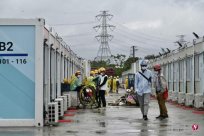Deng Bingqiang, director of the Hong Kong Security Bureau, said that it will further improve the maintenance of national security legislation, including the legislation of Article 23 of the Basic Law, and the network security responsibility of key infrastructure operators by legislative methods.He pointed out that 23 legislative directions and some regulations will cover espionage and crimes that violate national security on the Internet.
Deng Bingqiang said in an interview with the Grand Press that the implementation of the Hong Kong National Security Law has effectively maintained national security, the social order has recovered rapidly, Hong Kong returned to the right track, the rule of law was manifested, and the business environment continued to improve.After the implementation of the National Security Law, data such as the establishment of start -ups, the fund fundraising, the turnover of Hong Kong stocks, and the total value of the total value of the Hong Kong Special Administrative Region's assets and wealth management business have risen.
The Hong Kong Chief Executive Li Jiachao revealed many times that the legislation has set a schedule, and the legislation will be legislative next year.Deng Bingqiang, who has been promoting legislative work, said that the situation of Hong Kong society in recent years, as well as the national security risks faced by Hong Kong, the legislative direction and some regulations will cover the crimes that violate national security on the Internet and violate national security.
Deng Bingqiang pointed out that he saw some of the national security elements that still advocated and infiltrated in different ways and poured out foreign forces; the Internet was often used as an act of inciting national security.
Deng Bingqiang emphasized that it will further improve the maintenance of national security legislation, including the legislation of Article 23 of the Basic Law, and the network security liability of key infrastructure operators in the SAR Government in the SAR Government.He pointed out that what Hong Kong has experienced in recent years is exactly that "soft confrontation" such as "soft confrontation", online speeches and publications such as "soft confrontation" can easily intensify the public.
Deng Bingqiang took the case of Yangcun picture book as an example, saying that the three children's picture books described in the case when sentenced the judge had incitement diagrams, brainwashing to children, and guided children not to believe in Hong Kong's judicial system and despised the police.Only by fighting forces against political agencies can protect their homes.
He also mentioned that in March of this year, a group of people sold institutional books in Mong Kok, and each was sentenced to 5 to 10 months in prison.When sentenced, the referee pointed out that most of the people who are willing to buy the book were sympathetic, and even identified the violent behavior and slogan of the demonstrators; it is easier for them to make the black violence and rehabilitate, as if the time bomb was buried, so the law enforcement department will continue to targetThose who are suspected of endangering national security and organizations have conducted in -depth investigations, especially their financial sources, expenses, and relationships with external forces, and continue to detect forces that endanger national security with "soft confrontation" to spread the information of the opposite chaos, including"Online patrols" and criminal responsibility for people or organizations involving illegal activities.
Deng Bingqiang pointed out that the risks of spy activities cannot be ignored. He said that the country's intelligence agencies have publicly said that they will secretly master the materials of China from different countries and organizations in different countries and organizations around the world. Therefore, the governmentIt is inspecting which actions are not covered by the Hong Kong National Security Law and the current laws, including paying attention to espionage and network gaps to formulate effective and pragmatic solutions and provisions to further improve the mechanism of maintaining national security.
Deng Bingqiang's explanation of Article 23 of the Basic Law stipulates that in the seven types of acts that should be prohibited by legislation, the Hong Kong National Security Law covers two types of division of countries and subverting the Central People's Government.The current Hong Kong law (such as the Criminal Crime Regulations, the Regulations on Official Confidentiality and the Regulations of the Society) only covers some of the relevant behaviors, so it needs to be improved.He said: "With the combination of the Hong Kong National Security Law and Article 23 legislation of the Basic Law, it must be able to achieve one plus one greater than two to maintain national security in all aspects."


